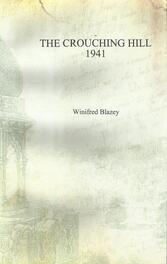 Cover of the 2015 print-on-demand edition from Isha Books, India.
Cover of the 2015 print-on-demand edition from Isha Books, India. I had high hopes for The Crouching Hill not only for its deliberate genre choice but also because the author’s two earlier efforts were compelling and rewarding reads.
The plot is a strange blend of sordid realism and Golden Age-era whodunit, with neither type landing satisfactorily. Schoolteacher Marion Francis is one of four staff members accompanying a group of girl students to the country, where the girls are to spend their holiday “billeted” with local villagers. After their charges have been paired with their host families, the teachers take rooms at the Rose and Thorn Inn, where Miss Francis and colleague Ursula French drink heavily and mix with the men in the pub. In the morning, Miss Francis is found “suffocated and strangled” in her bed; a post-mortem reveals that she was pregnant. The inspector immediately suspects her roommate Miss French (of the murder, that is), and those suspicions are heightened when a pair of local schoolboys claim to have interacted with the woman earlier that day, then disguised as a male motorcyclist.
While Blazey is quite good at crafting observations of social attitudes and human quirks, the tone of this book never quite settles. The details are too often squalid and grim – a pregnant woman’s death, a hasty tumble in the pub with a travelling salesman, a lecherous, rheumatic old man who relates his eavesdropping to the inspector with a leer and a wet-eyed wink – and the plotline (and certainly the story’s resolution) offers little joy or catharsis.
Taken as a novel of detection, well… It’s a litany of endless interviews, and there is no real fair play at work because the motive remains hypothetical until the killer steps forward to confess and explain. (There’s also an alibi reversal in the final chapter that feels like quite a cheat.) I get the feeling that, although she is using a familiar genre structure, Blazey isn’t interested in presenting a game to challenge the reader. The problem is that no larger theme is allowed to resonate, in part because no character is explored to a depth that makes us feel we understand him or her.
If her earlier, better books are an indication, I think the author is most interested in sending her fictional protagonists through a crucible, coming out either strengthened or defeated on the other side. In The Crouching Hill – even the title’s imagery of a landscape waiting to spring is referenced but never successfully activated in the story – Winifred Blazey’s true protagonist, the fated Marion Francis, is dead on the first page, her motivations and character a muted mystery, and no one, including the author, is quite able to bring her back to life.
 RSS Feed
RSS Feed